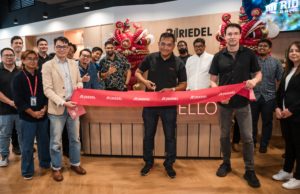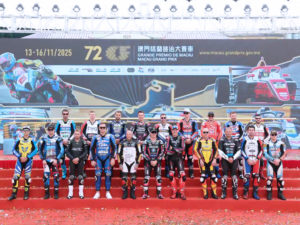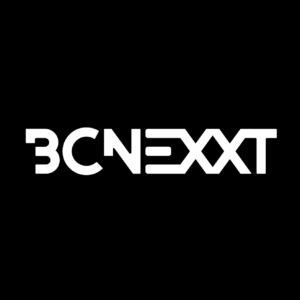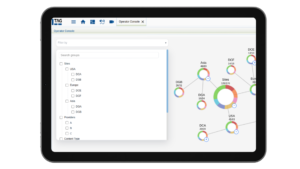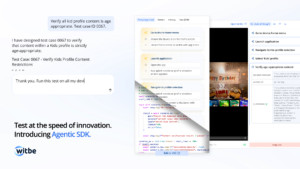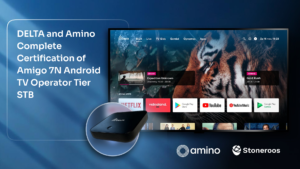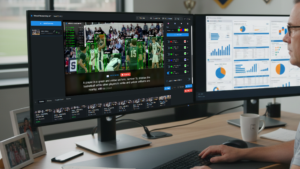IABM Student Bursary scheme – 15 years of fostering new talent for the Broadcast and Media industry
Stuart Ray, Head of Skills and Development, IABM
Now in its fifteenth year, the IABM student bursary scheme offers students from some of Europe’s top Media technology courses a Delegate Pass to IBC in Amsterdam.
At IBC24 students from RheinMain University in Wiesbaden, Solent University in Southampton and L’Université Polytechnique Hauts-De-France Valenciennes will once again have a chance to experience everything IBC has to offer – from wandering the many Exhibitor Halls to attending conferences.
Over 100 students have benefitted from the scheme since its inception, with travel, hotel and daily expenses covered by the IABM, together with close mentoring from the IABM team throughout the event to ensure they get the most out of the experience.
Can you remember your first time?
Your first IBC is always an experience unlike any other – the sheer magnitude of the exhibition can be quite overwhelming. But it is a fantastic opportunity to build networks and find out what is happening at the cutting of broadcast and media technology.
We’ve been in touch with a few of the successful bursary students over the years to find out their memories of attending IBC with the IABM scholarship and how it has impacted their career choices.
For most it was their first time visiting. “The scale of things was just immense and being thrown in from student life to the deep end of the broadcast industry and seeing every technology and software and different workflows available just in one place was amazing,” was how Daniel George (2019 Bursary Student, Solent University) described it.
Dan Ashley-Smith (2010 student, Ravensbourne University) said: “I had already attended other broadcast exhibitions in the UK prior to visiting the IBC (such as the ‘Video Forum’ at Earls Court) but was shocked to see the difference in scale – IBC was huge in comparison, and felt overwhelming when you saw just how big and diverse our industry really is.”
For Fatih Akkoc (2019, RheinMain University, Wiesbaden) it was the realization that Media Technology was not necessarily the “little, niche course topic” he had thought it was. “It was on an international scale and we had (IABM Bursary) students from France, from England, from St Petersburg – it was really great to get in touch with them and find out their background, what they study – and you can always learn something from other people.”
Many of the bursary winners commented on how the experience of going to IBC opened their eyes to aspects of the industry they had not really considered as potential career paths. “I think it really helped me,” says Craig Garder (2010, Ravensbourne). “You learn so much in your ecosystem and Ravensbourne did a really good job of making sure it’s hands on and making sure that you’re going out and getting work experience. And that’s a really valuable thing, but you’re so focused on your learning. And then you start to hear some of these larger concepts, and you start to understand them and you get immersed a little bit more, and then to actually go and see it and touch it and talk to people who are in it, I think that just really solidifies the whole thing. It just makes it more complete in that regard.”
Dan Ashley-Smith says, “I think for me, it was obtaining a broader and contextualized view of what made up our industry, because there were so many different elements to see. Even if it wasn’t necessarily in areas that I was focused in on, it was still good to have visibility of what was involved (be it on the production or delivery side.) It was also good to get a heads up on what areas to start learning more about, see the direction in which the industry was moving in, and start focusing in on areas such as the IT aspect of broadcast. I decided to specialize in IT when I was at Ravensbourne, off the back of my trip to the IBC, because I realized just how important those skills were going to be, and how in demand they would be in years to come. Judging by the dependence on IT throughout the projects I’ve worked on since, I definitely made the right choice.”
Daniel George: “I reflected on it as being a really kind of profound kind of turning point in that there was a lot more to this industry than I realized. That really broadened my mind as to what I actually potentially wanted to pursue full-time.”
Any first-time visitor to IBC can find the experience daunting, but for students it can feel doubly so. Alexandre Lavaud, a graduate of the Université Polytechnique Hauts-de-France in Valenciennes, and a bursary winner in 2022, observed: “it was very impressive of course for us because we were just little students going in the big professional world so it was very difficult to feel like legitimate people there… but the main point for me was to feel more confident to find a bigger company that I’ve ever thought about to work in after my studies.” Alex now works as a Digital Compositor for MPC in Paris, “…and I’m quite sure that before attending IBC 2022, I was not even thinking about trying to work here.”
Happy Talk
It can feel intimidating as a student at IBC, wondering if people on the stands will have the time or inclination to talk to you. But most of our bursary winners found exhibitors very open and willing to engage. Indeed, some felt it was quite a nice relief for those exhibiting to be able to have a break from being in ‘hard sell’ mode all the time.
“Going in as a student was more helpful in learning about technologies and things we didn’t have exposure to before because it meant that the people working the stands weren’t primarily focused on selling. They were more than happy to explain because they’d already identified you as not someone that they thought they were going to get a multi-million-pound contract out of. But they were still happy to talk and have that conversation. So you could benefit a little bit more not having been approached from a sales perspective,” says Daniel George.
Craig Gardner agreed: “Obviously, if a client did walk up to the stand, they were going to move over to the client thing. So you’ve got to be prepared for that. But at the same time, there’s probably an element of relief that they can just have a regular conversation and actually teach someone something.”
Fatih Akkoc (2019, RheinMain) felt that some exhibitors were more willing to talk to him because he was a student. He pointed out that bursary winners can “use this privilege of being a student because people will look at you as okay, you’re someone who wants to learn something. You’re not the competition, you’re not from another company. Everywhere I went, I talked to people, I asked them questions and they were so open and wanted to talk.”
Daniel George added: “And the fact that it was a much more open-minded discussion rather than a sales pitch, which definitely boosted the educational factor for me. It meant I could actually ask questions and get an honest answer rather than, you know, a competitive sales answer. And we found that they are always really kind of open to reaching out and actually engaging because at the end of the day, you are the next generation of talent who are going into the industry.”
The opportunity offered by IABM is greatly valued by the partner universities, with a rigorous selection process in place to choose the lucky winners. “The networking opportunities with engineers and executives of industrial companies has done a lot to boost their motivation, professional orientation and confidence to work for our industry”, said Professor Wolfgang Ruppel of RheinMain University. “We are very proud and honored to have been a partner university of IABM for so many years.”
Michel Pommery, co-ordinator of the Media Technology department at Université Polytechnique Hauts-de-France added, “The IABM Student Award selection process is one of the highlights of our academic year. Not only does it enable some of our students to attend IBC in Amsterdam, a valuable experience in itself for anyone intending to work in the broadcast and media sector, it also allows us to insist upon the importance of regular technology watch activity in order to keep up to date with innovations, along with the ability to communicate well in English. The skills they develop throughout the selection process are an asset in their professional life.
“The award winners always appreciate their time at IBC which gives them a real opportunity to discover the latest technologies and trends, and exchange with professionals and other students from around the world. This very often leads to informative discussions and projects with their classmates (and indeed lecturers) after the exhibition as they share what they have seen and learned.”
Making the most of It
We asked our former winners to give their top tips for the ten IABM Bursary students attending IBC in 2024.
As IABM bursary students have a pass which includes access to the Conference programme, many commented that this was a chance not to be missed. “The conferences were really great,” said Fatih Akkoc. “I remember there was a Hollywood panel where Warner Brothers, Disney and also some other executives were sitting there and talking about the Hollywood vision for 2030. It was really great to be there and listen to the big players.”
Daniel George observed that “Going along to the conference panels was really interesting – things like major asset management in complex international workflows and the kind of stuff that’s quite niche, but it was really good to get an appreciation for different parts of the industry.”
Craig Gardner remembers attending a particular session in 2010. “They were talking about product placement replacement. So if you had a Coke can, you were able to replace it with a Pepsi can. It just felt so interesting. It’s so funny because I watched that talk, super interesting, and then walked away with it thinking I have no idea how that is going to impact me at all. And now I’m talking to companies that do product placement! I’d seen it 14 years ago and now we are looking at implementing it into some of our workflows. So I think if future attendees have the opportunity to attend the conference and pick out things that sound interesting or pick out things that they don’t know anything about, I think it’s a valuable use of their time.”
Another common recommendation was to plan ahead – study the programme or use the app to identify particular companies or conference sessions you want to see. “Definitely do a little bit of prep work. It’ll pay dividends,” says Craig Gardner.
“You should be prepared,” Fatih Akkoc says. “There are these exclusive panels so I suggest to go ahead read through the program and pick some interests.”
Christoph Gerdener (2019, RheinMain) agrees. “I would definitely say get the program and look through everything, mark everything that you think is interesting. I remember very, very clearly there was one session on career development advice for students with BBC, ITV, Sky etc. And I was the only student that showed up! I had five different people from five different broadcasters, just talking to me for an hour!”
Others highlighted the international aspect of the Bursary programme and the benefits that can bring. “First and foremost, get to know the people you’re there with,” said Daniel George. “It makes your experience both as a delegate and as a visitor to Amsterdam so much more beneficial when you’re able to go around the exhibits as a group. It’s a lot less intimidating when you’re travelling as a group and kind of moving as a pack rather than, you know, just one sheepish, fresh-faced student there yourself.”
And all were clear on one thing – the opportunity to network and make connections is too good to miss.
Christoph Gerdener commented: “I think at the beginning I was somewhat shy, but then I like was just, get over it! Hey, here’s my LinkedIn. Can you just add yourself? And so I still have like a lot of like those connections there.
“And you never know when that might come in useful. It’s very much an industry where people know each other. The network thing is really important.”
“Speak with people, build contacts, try and organize work experience with companies if you can,” says Dan Ashley-Smith. For Fatih Akkoc, due to complete his Masters in the next few months, it’s also about future planning. “Go ahead, talk to those people who are professionally there and ask them, okay, what are you doing for a living? And get a profile. It can give a much, much clearer vision for their own future. Because for a student that’s the biggest question of all – what am I going to do with my degree afterwards? So, while networking with others you should also focus on that.”
See you at IBC
There will be ten IABM Bursary winners at IBC this year. If you see them please do say hello. After all, it’s down to YOUR membership of IABM that we are able to give them the opportunity to be at IBC. And if you can offer any demos or time to formally meet them please do get in touch and let us know via training@theiabm.org.
Where are they now?
The former bursary winners who contributed to this article are:

Fatih Akkoc – Cloud Engineer, SWR, Germany

Dan Ashley-Smith – Freelance Broadcast Systems Integration Engineer

Dan George – Operational Production Engineer, BBC, London

Craig Gardner – Snr Director Media Operations NBC Universal, USA

Christoph Gerdener – Live IP Engineer WDR, Cologne, Germany

Alexandre Lavaud – Digital Compositor, MPC, Paris, France
